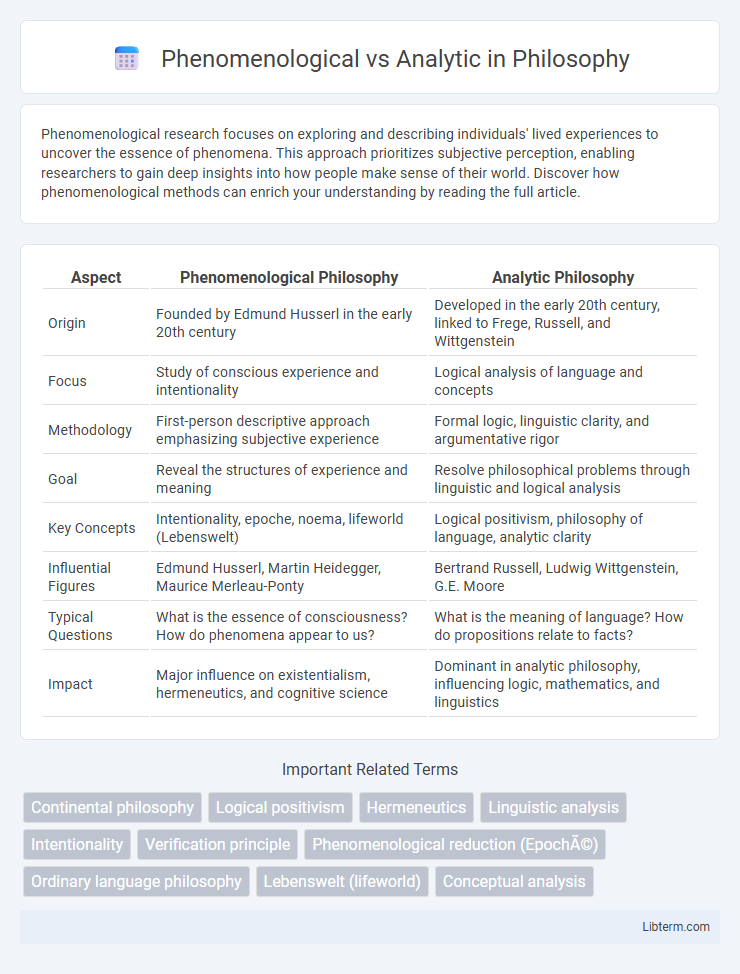Phenomenological research focuses on exploring and describing individuals' lived experiences to uncover the essence of phenomena. This approach prioritizes subjective perception, enabling researchers to gain deep insights into how people make sense of their world. Discover how phenomenological methods can enrich your understanding by reading the full article.
Table of Comparison
| Aspect | Phenomenological Philosophy | Analytic Philosophy |
|---|---|---|
| Origin | Founded by Edmund Husserl in the early 20th century | Developed in the early 20th century, linked to Frege, Russell, and Wittgenstein |
| Focus | Study of conscious experience and intentionality | Logical analysis of language and concepts |
| Methodology | First-person descriptive approach emphasizing subjective experience | Formal logic, linguistic clarity, and argumentative rigor |
| Goal | Reveal the structures of experience and meaning | Resolve philosophical problems through linguistic and logical analysis |
| Key Concepts | Intentionality, epoche, noema, lifeworld (Lebenswelt) | Logical positivism, philosophy of language, analytic clarity |
| Influential Figures | Edmund Husserl, Martin Heidegger, Maurice Merleau-Ponty | Bertrand Russell, Ludwig Wittgenstein, G.E. Moore |
| Typical Questions | What is the essence of consciousness? How do phenomena appear to us? | What is the meaning of language? How do propositions relate to facts? |
| Impact | Major influence on existentialism, hermeneutics, and cognitive science | Dominant in analytic philosophy, influencing logic, mathematics, and linguistics |
Introduction to Philosophical Methodologies
Phenomenological methodology emphasizes direct analysis of conscious experience to reveal the structures of phenomena as they appear to the mind. Analytic philosophy prioritizes logical clarity, argumentative rigor, and language analysis to address philosophical problems systematically. Both methodologies shape contemporary philosophical inquiry by contrasting subjective experiential insights with objective linguistic and conceptual frameworks.
Defining Phenomenological Philosophy
Phenomenological philosophy focuses on the systematic study of structures of consciousness and experience from a first-person perspective, emphasizing phenomena as they present themselves to awareness. This approach, founded by Edmund Husserl, seeks to reveal the essential features of lived experience by bracketing preconceived notions and analyzing intentionality--the directedness of consciousness toward objects. In contrast to analytic philosophy, which prioritizes logical analysis and language clarity, phenomenology prioritizes deep descriptive investigation of subjective experience and meaning.
Key Principles of Analytic Philosophy
Analytic philosophy emphasizes clarity, logical rigor, and linguistic analysis, prioritizing precise argumentation and the investigation of language's structure. Key principles include the use of formal logic to dissect philosophical problems, a commitment to scientific methodology, and the belief that many traditional philosophical issues arise from misunderstandings of language. This approach contrasts with phenomenology's focus on direct experience but remains foundational in contemporary philosophy for its systematic and analytical techniques.
Historical Origins and Evolution
Phenomenology, founded by Edmund Husserl in the early 20th century, emerged as a rigorous study of conscious experience through intentionality and first-person perspective, emphasizing direct description of phenomena without presuppositions. Analytic philosophy originated in the early 20th century with figures such as Bertrand Russell and G.E. Moore, prioritizing logical clarity, language analysis, and scientific methodology to address philosophical problems. Both traditions evolved through distinct historical contexts, with phenomenology influencing existentialism and hermeneutics, while analytic philosophy shaped linguistic philosophy and formal logic trends in Anglo-American academia.
Major Figures in Phenomenology and Analytic Philosophy
Major figures in phenomenology include Edmund Husserl, who founded the movement emphasizing the direct investigation of experience and consciousness, and Martin Heidegger, known for his exploration of Being and existential ontology. In analytic philosophy, key contributors are Bertrand Russell, who advanced logical analysis and language philosophy, and Ludwig Wittgenstein, whose work on language games and meaning profoundly influenced analytic thought. These figures shaped their respective traditions through rigorous examination of language, experience, and reality.
Core Concepts: Consciousness vs. Language
Phenomenological philosophy centers on consciousness as the primary means of experiencing and understanding reality, emphasizing subjective experience and intentionality. Analytic philosophy prioritizes language, treating linguistic analysis as key to clarifying meaning and solving philosophical problems. The core distinction lies in phenomenology's focus on the lived experience of consciousness versus analytic philosophy's emphasis on the structure and function of language.
Methodological Differences and Approaches
Phenomenological methodology emphasizes first-person experience and intentionality, aiming to describe consciousness without presuppositions through techniques like epoche and eidetic reduction. Analytic methodology prioritizes logical analysis, clarity, and argumentative rigor, often employing formal logic and language analysis to dissect concepts systematically. The phenomenological approach is inherently descriptive and interpretive, while the analytic approach is predominantly critical and explanatory, reflecting distinct epistemological commitments.
Influence on Contemporary Thought
Phenomenological philosophy, founded by Edmund Husserl, emphasizes direct experience and consciousness, profoundly shaping existentialism, hermeneutics, and cognitive science. Analytic philosophy, rooted in formal logic and language analysis, has driven developments in philosophy of language, philosophy of mind, and epistemology. Contemporary thought integrates both approaches, fostering interdisciplinary dialogue that enriches understanding of human experience and logical structure.
Areas of Convergence and Divergence
Phenomenological and analytic philosophy converge in their rigorous analysis of experience and language, aiming to clarify human understanding. Phenomenology emphasizes the direct description of lived experience and consciousness structures, while analytic philosophy prioritizes logical analysis, language precision, and argumentative clarity. Divergence arises as phenomenology explores subjective intentionality and meaning, contrasting with analytic philosophy's focus on objective linguistic and conceptual frameworks.
Future Directions in Philosophical Inquiry
Future directions in philosophical inquiry emphasize integrating phenomenological approaches with analytic precision to enhance the understanding of consciousness and experience. Emerging research explores hybrid methodologies combining phenomenological descriptions with analytic clarity to address cognitive science and artificial intelligence challenges. Cross-disciplinary collaboration between these traditions aims to develop comprehensive frameworks for ethical decision-making and human-computer interaction.
Phenomenological Infographic

 libterm.com
libterm.com